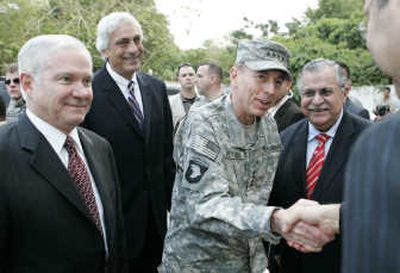Iraq bombings kill 22 during Gates visit

BAGHDAD – At least 22 Iraqis were killed in four car bombings across Iraq on Wednesday, underscoring the persistent danger as U.S. Defense Secretary Robert M. Gates visited the country to see the effects of a recent drop in violence.
In the day’s deadliest attack, a car bomb exploded outside a juice shop in the central Baghdad neighborhood of Karada, killing at least 14 people and injuring 33, police said.
The U.S. military also announced the deaths of three American soldiers in an attack the previous day involving a roadside bomb and small-arms fire in Salahuddin province, north of the capital. Another soldier was injured in the ambush. The deaths lift to 3,886 the number of U.S. personnel killed since the start of the Iraq war in 2003, according to the independent Web site icasualties.org.
U.S. officials in November trumpeted a 55 percent drop in attacks since the deployment of about 28,500 additional troops in Baghdad and surrounding regions was completed in mid-June. The reduced bloodshed has been accompanied by significantly lower civilian and military death rates.
One of Gates’ main objectives Wednesday was to assess whether progress could be sustained as troop numbers are reduced.
“More than ever I believe that the goal of a secure, stable and democratic Iraq is within reach,” Gates told reporters, though he added that “much remains to be done.”
Gates, on his sixth visit to Iraq since taking office last December, said the more than 70,000 Iraqis who have volunteered to join the fight against the Sunni militant group al-Qaida in Iraq must be incorporated into the country’s security forces or found other employment.
Prime Minister Nouri al-Maliki’s government has expressed reservations, fearing that the mostly Sunni volunteers, some of them former insurgents, could turn their guns against the Shiite-led authorities once U.S. forces leave. But the Interior Ministry, which oversees the police, recently agreed to take over the contracts of up to 12,000 people in Baghdad who are being paid by U.S. forces to help secure their neighborhoods.
A string of top U.S. military and diplomatic officials also have pressed Iraqi politicians to capitalize on the security gains to push through compromises on power-sharing laws considered key to long-term stability.
The explosion in Karada happened shortly before Gates spoke inside Baghdad’s fortified Green Zone. The ebb in violence has brought crowds of shoppers back into the district’s commercial streets.
It was the worst blast to hit the capital since September, when 32 people died in an attack in Baghdad’s Bayaa neighborhood. Last month, at least 13 people were killed when a bomb went off in a popular Baghdad pet market.
Wednesday’s blast took place near a Shiite mosque, which police said suffered some damage. It was not clear if the mosque was the primary target.
Most of the day’s serious attacks happened north of the capital, in areas that have seen an influx of Sunni militants since pressure mounted on them in Baghdad and al-Anbar province, to the west.